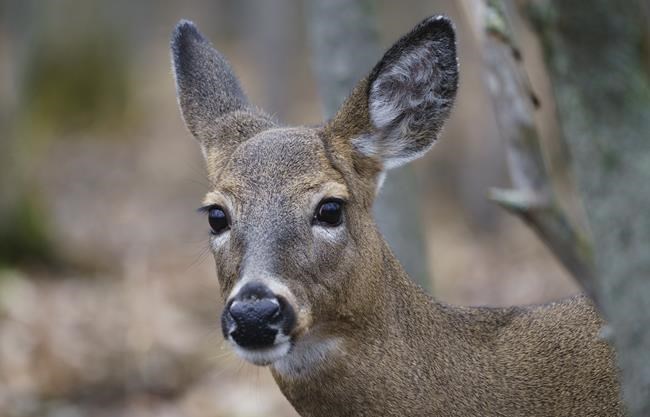LONGUEUIL, Que. — A city south of Montreal announced Tuesday that it has revived a controversial plan to kill most of the deer in a local park, about a year after it backed off from a similar initiative because of public pressure.
Longueuil Mayor Catherine Fournier said Tuesday she would follow the recommendations of a committee that stressed the need to drastically reduce the number of white-tailed deer in Michel-Chartrand park.
"We realize that there is an urgent need to reduce the deer herd in the park in order to avoid significant additional damage to natural environments, already severely weakened by the overpopulation of deer," Fournier said in a statement.
"Taking into account all scientific, ethical and environmental aspects, this is the only possible way forward at this point, as the situation has worsened greatly, particularly in the past year."
The committee of experts, local organizations and citizens created to propose ways of protecting the park found that it was home to more than 70 deer last spring — more than five times the number of animals it can comfortably support. The deer population was pegged at around 30 when a previous deer cull plan was announced in 2020.
The committee's report concluded the park's natural areas were "so degraded they could no longer regenerate" due to a number of factors including emerald ash borer infestations, invasive plant species, visitors not respecting park rules and the large number of deer stripping vegetation.
The committee said it considered other options, including relocating the deer or reducing their numbers with sterilization or birth control, but it concluded the only viable short-term option was to capture and euthanize all but 10 to 15 animals, with the meat donated to food banks.
Just leaving the deer alone would be dangerous to deer and humans alike, the committee found, due to the risk of automobile collisions near the park, ticks spread by deer and malnutrition among the animals.
Longueuil's previous administration had planned to kill about 15 deer from the park last year, but it relented after a strong backlash that included a petition, a protest and threats against the former mayor.
A plan to instead relocate the deer to a sanctuary subsequently fell through after a veterinary ethics committee said the proposal would have endangered the lives of deer and their handlers.
Late Monday, Sauvetage Animal Rescue, the group that had offered to help relocate the animals, expressed dismay at the latest turn of events. The group said on its Facebook page that while it had originally offered to relocate the deer, it had also offered to work with vets and biologists on a project to sterilize them.
The report published by the committee concluded that sterilization could be part of a long-term solution but was normally only successful in small, isolated populations, and it often involves some deer being killed.
Longueuil spokesperson Hans Brouillette said Tuesday there are still several steps remaining before any deer are killed, including approval by city council and the provincial Wildlife Department.
Brouillette said it was unclear how long the process would take, but he noted that the report recommended culls be carried out in the fall, likely to avoid orphaning fawns or killing heavily pregnant females. He said the deer population has likely increased since the survey was carried out in the spring, and will grow even more by the time the cull begins.
This report by The Canadian Press was first published Nov. 30, 2021.
The Canadian Press



